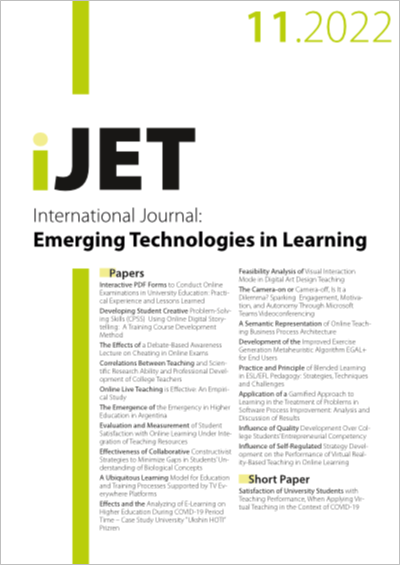Developing Student Creative Problem-Solving Skills (CPSS) Using Online Digital Storytelling
A Training Course Development Method
DOI:
https://doi.org/10.3991/ijet.v17i11.29931Keywords:
Padlet, online training, online learning, creative problem solving, creative thinking, critical thinking, Thailand, digital storytellingAbstract
This study set out to research and evaluate the needs in developing creative problem-solving skills (CPSS) of undergraduate students through developing and evaluating a digital storytelling process using Padlet. The sampling process used simple random sampling to select 332 teachers from 83 schools in Bangkok. The data was collected using a needs assessment questionnaire, training course questionnaire, and satisfaction questionnaire. Descriptive statistics used for the analysis included frequency, percentage, mean ( , and standard deviation (SD). The data collected were mean scores of expert validity testing and student inter-rater reliability testing. The assessment evaluated student satisfaction toward the CPSS training course using 30 students in the Computer Education Program at Dhonburi Rajabhat University's Faculty of Education in Thailand. The findings revealed that of the four aspects identified for developing undergraduate CPSS, elaboration was at the top of the priority of needs (PNIModified = 0.20). This was followed by originality and flexibility (PNIModified = 0.19). Finally, was fluency (PNIModified = 0.18). Also, analysis of the prospective condition was ranked ‘high’ across all four aspects with an average of = 4.38 SD = 0.06. Further analysis of the real condition showed that all four aspects had an average of = 3.67, SD = 0.06. The study contributes to the literature in that it demonstrated that correctly developed and implemented undergraduate student CPSS can increase significantly. This fact is critical in knowing as a nation’s future depends on its workforce and leaders having CPSS.
Downloads
Published
How to Cite
Issue
Section
License
Copyright (c) 2022 Ms., Associate Professor Dr., Associate Professor Dr.

This work is licensed under a Creative Commons Attribution 4.0 International License.



